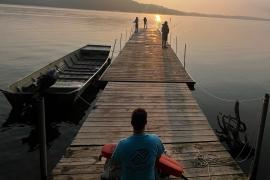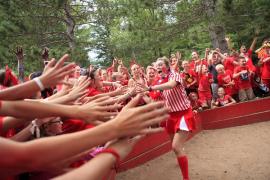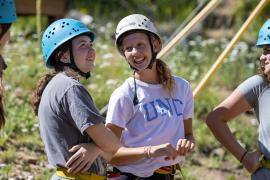Qualified candidates always have choices. If your candidate experience is slow, clunky, and vanilla, you’re likely losing out on top talent.
As you prepare for the 2025 hiring season, consider each stage of your recruitment process from the lens of a candidate, and identify opportunities to improve it. A streamlined experience will give you a competitive edge and the best chance to land sought-after talent. It’s a worthy use of your time. Here’s why.
Why the Candidate Experience Matters
Candidate experience is defined by how candidates feel about your camp as they experience your hiring process. It starts early on, as they read your job description and browse your website, and lasts until their first day of work. Everything in between, from interviews to onboarding, is part of the candidate experience. These collective moments translate to feelings, either positive or negative, that can have significant influence over whether or not a candidate decides to join your organization. Beyond that, candidate experiences can have lasting impacts on your employer brand as a whole, and your ability to attract top talent. It’s why the best companies in the world that operate in highly competitive environments invest heavily in creating a best-in-class hiring process that leaves lasting impressions on applicants.
When done right, a positive candidate experience will unlock new talent pools and boost referrals, easing the strain on sourcing. According to data from Talent Board, 81 percent of candidates share positive recruiting experiences with others. Just think about what that could do for your referral program! When done right, the candidate experience can:
- Lead to a high volume of applications and accepted offers
- Differentiate your employer brand in the marketplace
- Boost candidate referrals
- Give you a competitive edge
Unfortunately, the flipside is also true. When the candidate experience is neglected, it can have a detrimental impact on your ability to hire. Data from CareerPlug shows that 49 percent of candidates have declined a job offer because of a poor candidate experience. I know I have, and the reasoning is not hard to relate to. We all want to feel good about the places we decide to work at, and if something feels off, it can sway decisions, especially for applicants that have choices. When done poorly, the candidate experience can:
- Decrease the volume of applications
- Lead to declined offers and a high rate of drop-outs
- Increase candidate ghosting
- Negatively impact your employer brand
By now, you’ve probably come to terms with the fact that recruiting for camp is HARD. It’s a highly competitive environment and the complex logistics around camp (housing, travel, etc.) are an added hurdle to overcome. But don’t take my word for it, check out the data from ACA’s 2022 CampCounts Survey.
- 33 percent of camps said they didn’t have enough staff
- 68 percent of camps say it’s harder to recruit now than in 2019
- 72 percent of camps had a staff member resign before camp or during their contract
This data tells us a cohesive story. Recruiting for camp is harder today than it’s ever been. Turnover is high, and a significant number of camps fail to meet their staffing needs. That’s why it’s important to offer a meaningful candidate experience. When done right, positive experiences can help alleviate some of these pressure points and set you up for success.
The Camp Application Needs an Overhaul
The most glaring candidate experience opportunity for camp is the application process. If you are going to focus on one recruiting improvement initiative this year, it should be the application. From the application length, to the types of questions asked, to the platforms being used, frankly, every element needs an overhaul.
Before writing this blog, we did some basic research into how camp applications are used in practice. Our goal was to put ourselves in the shoes of the average job seeker and experience the process from their lens. We logged onto a handful of camp websites and filled out applications as if we were prospective candidates. The results were concerning. What we encountered was a long, tedious, disjointed, and sometimes intrusive experience. Here is a summary of our findings.
Camp Applications Findings
- Number of Questions: 12 to 30+
- Types of Questions: Contact info, employment history, essay questions, highly personal information (social security number, T-shirt size, marital status, drivers license number), character references.
- Platforms Used: Camp management software, Google Surveys
- Time Commitment: 15 min to 45 min
What we learned from this experience is that the front door to camp can be intimidating and not-so-welcoming to prospective candidates. Most camp applications we encountered had dozens of questions (some of which felt intrusive), essay prompts (some of which required deep thought and advanced writing skills), duplicative requests (asking for the same information listed on a resume), and required at least 15 minutes of focus to complete. Most applications required us to create a username and password, upload a photo of ourselves, and specify dietary restrictions. All of this — just to apply. There were multiple times where we had to pause because we didn’t have the information we needed to complete the application readily available (essays, references), and the experience on mobile left something to be desired. It was rough.
Let’s play this experience out. Imagine you're a candidate sitting down to fill out a camp application. You are on your phone and realize that you have to answer four long-form essay questions, provide three character references, upload a photo of yourself, provide your social security number, and key in your driver's license. Would you continue in the process or abandon the application and find something more approachable? I know what my answer would be, and I'm not alone. In a study done by the recruitment data provider, Appcast, 92 percent of candidates never finish online job applications. And we all know, the best candidates, and those who have choices, know they don’t need to waste their time on tedious job applications.
This experience was an eye opener, especially when you contrast it to job boards like Indeed that offer a streamlined application format that allows candidates to apply to dozens of jobs in a matter of clicks. We live in a world where candidates are accustomed to uploading their resume to a job site and using their pre-populated profile to apply to all the relevant jobs within their search criteria in a matter of minutes. It’s simple, it’s fast, and it maximizes the candidate’s chances of getting hired. Compare that experience with what is currently being offered at camps, and there lies the problem. It’s no wonder we have a hard time competing with internships and other summer jobs who have a much more streamlined job application than most camps. Let’s talk about ways to fix that.
Tips to Streamline the Camp Application Process
For starters, we recommend using the application process on job boards as much as possible, and repositioning your camp application for another stage in the hiring process. Doing so will allow you to take advantage of the streamlined process available on places like Indeed, and capture more candidates. According to Indeed data, using Indeed Apply can lead to five times more applications than directing candidate’s to an external site. Once a candidate is redirected to your camp’s job application page the chances of capturing that candidate decrease dramatically.
Streamlining the Application Process
- Simplify your camp application and use Indeed Apply
- Indeed Apply can lead do five times more applications (according to Indeed)
- Eliminate questions about info already contained in a resume
- Only ask questions that are relevant for this stage in the process
- Reposition elements of the camp application as part of onboarding
- Mobile friendly application
In Closing
Your application is a reflection of your employer brand and sends a strong message to candidates about how much you value the candidate experience. By streamlining your camp’s application process, you can significantly improve the candidate experience and make it easier for top talent to apply. Remember, the quicker and more efficient the application, the better your chances of attracting the best candidates in a competitive hiring environment. As we move into the 2025 hiring season, it’s time to rethink your approach — create a more welcoming, simplified process that reflects your camp’s commitment to a positive candidate experience.
This blog was written on behalf of ACA's Project Real Job, whose goal is to support camps in their efforts to recruit, hire, and retain staff.
Photo courtesy of Camp Friendship in Palmyra, Virginia
About the Author
Aaron Lyon is the founder of CampHire, a recruitment firm that supports summer camps and nonprofits organizations. CampHire specializes in seasonal staff recruitment in the US and executive search for year-round leadership roles. Aaron leads CampHire’s recruitment operations, overseeing applicant sourcing, HR systems and platforms, and workflow automation. Aaron is an alumni of Camp Yavneh in NH, and lives in Boston with his wife and three children. Aaron can be reached at [email protected].
The views and opinions expressed by contributors are their own and do not necessarily reflect the views of the American Camp Association or ACA employees.




